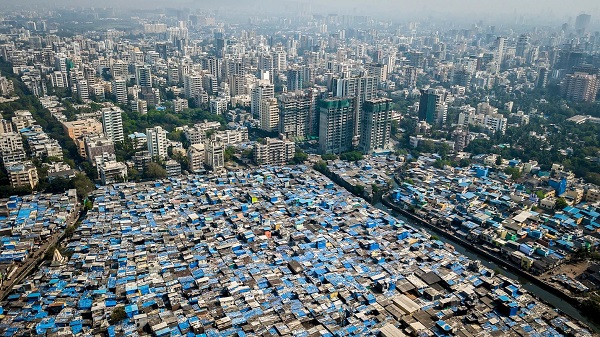Urban Poverty Working Group
 Slums vs suburbia in Mumbai, India © The Telegraph
Slums vs suburbia in Mumbai, India © The Telegraph
Urbanization – both an opportunity and a
challenge
Urbanization
is one of the defining challenges of our time.
In terms of numbers, it is estimated that in 2050 the share of people living in
urban areas will increase to 68%. Current and future
urban growth will mostly take place in secondary cities (>1 Mio.) in Asia
and Africa. The increase in the share of the urban population is mainly driven
by natural population growth and migration. In fact, cities have become the main
destination for migrants (refugees, economic migrants, rural-urban and
internally displaced persons (IDPs)). However, accurate and accessible
data on the relationship between migration dynamics and urbanization processes
is lacking in many low income countries.
Urbanization
can yield important economic gains that benefit also rural areas. Cities host businesses, markets, trade and (large scale) production,
thereby creating better matches between people, enterprises and products. The
economic advantages further consist in the availability of infrastructure and
services (eg. hospitals, schools, piped water systems). Moreover, cities are
centers of innovation, knowledge and exchange. Studies have highlighted that
well-developed towns and mid-sized cities, inter-connected with each other and
their rural surroundings, are central to the overall reduction of poverty and
inequalities within countries, and also in trans-border regions.
However,
urbanization also presents many challenges:
By 2050, it is estimated that more poor people
will be living in urban than in rural areas.[i]
As the growing labor force in cities exceeds the demand of the formal economy,
the informal sector grows. Urban governance tends to be week in many
countries due to ambiguity and confusion over the roles and mandates of
national, provincial and local government actors in delivering services at the
municipal level. Municipal governments lack accountability and responsiveness
and disadvantaged groups are often unable to articulate their needs in formal
urban governance processes. Deficient access to quality services (eg.
access to education, health, water and sanitation etc.) that affects poor and
marginalized groups disproportionally are a reality. The socio-economic
integration of migrants, internally displaced people
and refugees is insufficiently in many
cities what puts the social fabric under pressure. Violence and armed
conflicts are increasingly concentrated in urban areas. The negative
environmental impact of urbanization (eg. in terms of CO2 emissions) is a
further key challenge. Fast urbanization also increases cities’
vulnerability and risks regarding natural, man-made and climate change
induced disasters.
SDC
and Urbanization: Learning journey on urban-rural
dynamics and core working group
In view of such trends, the SDC’s South Cooperation
(SC) initiated a reflection process in 2016 on the future positioning of the
SDC in urban contexts. This process resulted in an Issue Paper which was
presented to the SDC board of directors in June 2017.
In 2017, a learning journey on urban-rural dynamics
started and built on work initiated in 2016. A core working group, which
includes members from the South, East and Global Cooperation as
well as the Humanitarian Aid, was created. Furthermore, a broader reflection group consisting of a network of
external experts on urbanization is associated to the learning journey.
The core working group reflects on the challenges and
opportunities of urbanization. As part of the discussion, the working group
also stimulates thinking about the impact of urbanization on development
cooperation and SDC’s programs. The core working group holds regular meetings
and (co-)organizes thematic events (eg. Brown Bag Lunches) together with
colleagues from different SDC departments.
[i] SDC Issue paper “SDC’s
future engagement in urban contexts” (2017, p. 2).
